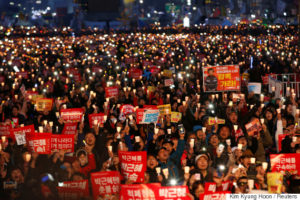Special to WorldTribune.com
 By Donald Kirk
By Donald Kirk
Donald Trump doesn’t get it. He warns South Korea about “appeasement,” but who’s appeasing whom?
Yes, President Moon Jae-In, hero of the candlelight protests that lofted him as the liberal darling into the presidency after the ouster of the conservative Park Geun-Hye, would love to go down in history as the one who brought about reconciliation on this conflicted peninsula.
No, that’s not going to happen any time soon, much to the chagrin of some of the ideologues and idealists who were counting on him to say yes to just about anything North Korea wants.

The North’s sixth nuclear test shows Moon is not getting anywhere in his quest for dialogue, and he knows it.
Confounding many of his more left-leaning followers, Moon is talking as tough as the conservatives who ruled for nearly ten years until Park’s downfall.
He’s chatting with the hated Japanese, and he’s vowing no more advances in North Korean “technology” for fixing a warhead onto a missile capable of “delivering” a warhead to the U.S.
He’s also calling for strengthening the South Korean armed forces in the face of North Korean threats, and he’s in favor of still stronger United Nations sanctions.
What does a legion of progressives have to say about their hero now?
“We must revive the candlelight revolution,” said a member of the far leftist New People’s Party. “He is not the president we elected in May.”
With 72 percent of South Korean voters still enthusiastic about him, Moon advocates say he’s trying to have it both ways ― talking tough to the North while hoping Kim Jong-Un will calm down enough to make a deal with the South.
Trouble is, Trump, the ultimate wheeler-dealer, seems unwilling to “make a deal” that will satisfy the Moon government, much less the North Koreans.
Having spoken on the phone with Japan’s Prime Minister Shinzo Abe, Moon did get Trump on the line to agree, sure, South Korea should develop a missile that’s twice as powerful as the Hyunmoo in the South’s inventory, but did they get around to the Korea-U.S. Free Trade Agreement, KORUS, that Trump would jettison along with all the other “unfair” deals of his predecessors?
Just as Moon is standing tough on North Korea, he’s not bowing to the U.S. on trade.
The question remains, are the U.S. and South Korean national security councils so tightly bound on defense as officials on both camps want everyone to believe?
Moon’s summit with Russia’s President Putin shows his desire to pursue a more independent course.
Officials, keenly aware of Korean sensitivities, while not openly deriding Trump’s “appeasement” tweet, dissociate themselves with off-record comments like, “You know how he is …. he doesn’t always mean what he says…. don’t take him literally.”
Beneath the level of the White House and the Blue House, South Korean diplomats and officials at the unification ministry, responsible for carrying out policy with the North, are busy coordinating in Washington and other capitals from Tokyo to London.
The goal is to line everyone up against North Korea.
Nobody seriously believes, of course, that Kim Jong-Un might abandon his program for turning North Korea into a nuclear power capable of brandishing nukes and missiles at targets near and far, but what about that “red line” that Moon said North Korea must not cross? It’s far from clear exactly where that line is while leaders of his Minjoo or Democratic Party of Korea have said he cannot risk a “second Korean War.”
Such talk leaves one wild card, namely the Trumpster himself. On the streets of Seoul, no one quite trusts him not to take matters in his own hands and fire away ― preemptively ― at North Korea’s missile and nuclear facilities.
Is Trump fully aware that North Korea might gain revenge by pouring conventional, old-fashioned artillery shells over the northern tier of South Korea, including Seoul and the industrial port city of Incheon. Not only South Korea but the region and much of the world would panic.
What South Koreans want, though, is often about as unclear as what Trump will do.
Credit the Americans with inspiring South Korean air strikes at targets simulating North Korean leadership. It was the U.S. that added “decapitation” to the lexicon of war games, giving rise to sardonic questions about who’s on “the decap list.”
Moon, however, professes not to be interested in “regime change” up there while awaiting a response to his pleas for a Moon-Kim summit. He’s in for a long wait.
Donald Kirk has been covering war and peace in the region for decades. He’s at kirkdon4343@gmail. com.
